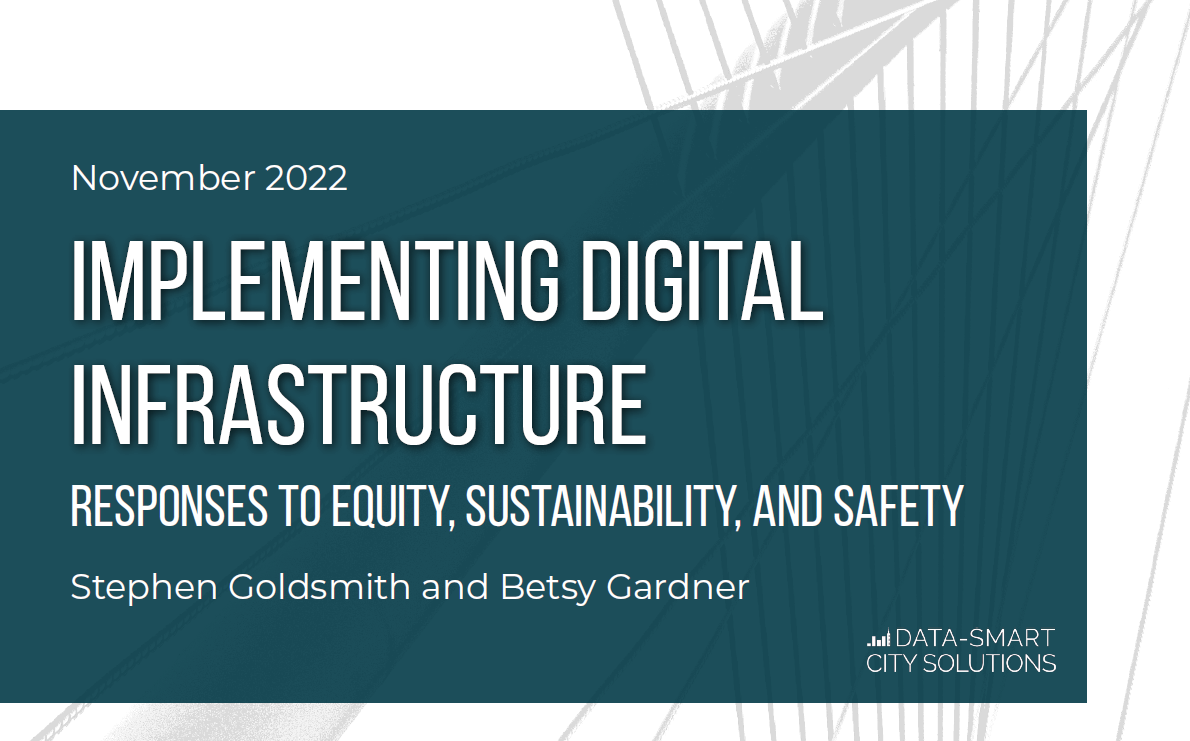- November 30, 2022
- Infrastructure
Local leaders across the United States have a unique opportunity to address crumbling infrastructure and increasing inequities thanks to trillions of dollars of new federal funding. The American Rescue Plan Act and the Infrastructure Investment and Jobs Act represent the largest infrastructure appropriations in decades. Yet while the scale of this new government funding is historic, it must be used wisely to provide returns on investment for decades to come.
The authors advocate for investment in digital infrastructure that incorporates hardware(like Internet of Things (IoT) devices), data software, platforms for analysis and collaboration, advanced data capabilities (to both manage and protect data), and a smart governance structure to oversee these tools through policy and regulation. Digital infrastructure assists in managing public assets, scheduling maintenance and monitoring safety, improving sustainability and accessibility, and prioritizing equity in investment, health, and quality of life.
Digital infrastructure supports broadly beneficial, important goals. For example, improving roads in Black communities not only combats historic disinvestment but also increases safety by establishing safe bike lanes and pedestrian paths. This in turn causes positive impact on public health through increased physical activity, decreased automobile emissions, and fewer traffic fatalities. While governments can improve road conditions without digital infrastructure, the data collected from intelligent tools like air quality sensors and traffic cameras empowers local officials to measure progress more easily and detect – and implement – necessary changes. Digital tools can facilitate faster and more expansive public engagement,inviting the community to codesign new infrastructure and vote on improvements.
Digital infrastructure necessitates nuanced digital and data governance. As the physical environment changes, so too must city policy. We recommend that local leaders take these approaches to maximize the impact and potential of digital infrastructure: increase administrative capacity to manage both connected infrastructure and resulting data; center privacy and data security; plan for transparency and share open data, particularly with groups that have previously been targets of oversurveillance; increase community engagement at all stages of infrastructure planning; prioritize equity in timelines, funding decisions, and quality of life improvements; and engage legal support around vendor technology, data protection, and data sharing.
If cities can facilitate these changes in governance and create or retrofit digital, connected infrastructure, they will be well-positioned to use the new federal funding to address the harms of the past and build safer, healthier, and more equitable futures.
This paper was produced with the support of the Knight Foundation. The authors are grateful for the
foundation’s investment in our work to assist cities in using digital infrastructure in novel
ways and strengthen their communities.
Download and continue to read Implementing Digital Infrastructure Responses here.



 Stephen Goldsmith is the Derek Bok Professor of the Practice of Urban Policy at the Harvard Kennedy School and the
Stephen Goldsmith is the Derek Bok Professor of the Practice of Urban Policy at the Harvard Kennedy School and the 
